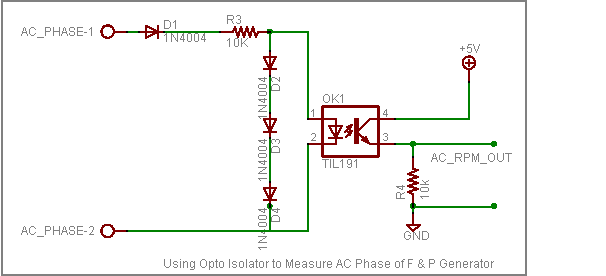
|

|
Forum Index : Electronics : Measure RPM with Multimeter
| Author | Message | ||||
Gill Senior Member Joined: 11/11/2006 Location: AustraliaPosts: 669 |
Has anyone tried measuring RPM using a multimeter? It works for me. I have several multimeters and they all have Frequency measurement, either in Hz or KHz. I use the aligator clip ends and hook across a phase into the rectifier. We have 56 magnets per revolution. 2 magnets per cycle (one North & one South), therefore 28 cycles per rev. This means: Meter reading in cycles per second (Hz)divided by 28 cycles per rev = Revs per Second. X 60 to bring it to RPM. Simplified: Hz x 2.143 = RPM for old hub Hz x 2.857 = RPM for new hub Accurate and great for field and bench testing. Bit more difficult up a tower as need to run 2 small meter wires up to there. Hay! hang the expense, it's only money. was working fine... til the smoke got out. Cheers Gill _Cairns, FNQ |
||||
| domwild Guru Joined: 16/12/2005 Location: AustraliaPosts: 873 |
Gill, Thanks for that. There may be two problems: One is the high range as on my cheapies it is only in 20 and 200 kHz. Second will be the voltage. Would my cheapy Dick Smith one measure the 100 VAC coming off that F&P without magic smoke escaping?? As I do not have a black belt in electrickery, pls let me know if I am justified in my scepticism or not. Taxation as a means of achieving prosperity is like a man standing inside a bucket trying to lift himself up. Winston Churchill |
||||
Gill Senior Member Joined: 11/11/2006 Location: AustraliaPosts: 669 |
Hi domwild, No problems with the range. Even on the prefered lower range of 20KHz (20,000Hz), this would cover a max generator RPM of: 20,000Hz x 2.143 = 42,860RPM. Wow! need I say more? A typical reading of 0.240 KHz gives 514.32RPM. (240Hz x 2.413 = 514.32RPM) As to the 100Volts, My 3 multimeters can handle 2 @ 500v, 1 @ 750v Dc&AC in the Frequency setting. I suggest you check the meters manual if in doubt. Alternatively, if the manual has gone walkabout as they often do, how about putting a couple of 100kOhme resistors on the end of each lead to drop the voltage just to be sure? Maybe someone else could give you a better way as there are several for reducing voltage for this measurement. I've just discovered my Protek 506 gives Fq and ACV at the same time. It also has a RS232 computer logging feature. I'm not into PIC's so this may be the poormans/dummies way of logging gen outputs. Better check it out. was working fine... til the smoke got out. Cheers Gill _Cairns, FNQ |
||||
RifRaf Newbie Joined: 15/10/2006 Location: AustraliaPosts: 32 |
Here is an example of using on optoisolator to measure the pulse in a safe way that can be fed directly to a microcontroller etc. Almost any opto you have can be substituted. 
Gill thanks for the explanation, i can now understand why my readings were out and different with the new rotor. Getting more reasonable rpm readings now and is great |
||||
| Pt w/field Matt Senior Member Joined: 24/02/2006 Location: AustraliaPosts: 105 |
hi rifraf its looks an easy circuit to put together but what are we suposed to do with the ac rpm output? matt down south |
||||
RifRaf Newbie Joined: 15/10/2006 Location: AustraliaPosts: 32 |
hi matt, i send the pulse to an avr for logging the RPM on a PC with the piclog application, you could hook the output upto a frequency meter. I also have the RPM displayed on an LCD screen now with windspeed at the betteries, very handy for testing blade performance with different rotors and stator windings. the opto isolator schem was just chopped from a schematic based on the same design as the piclogger and so may appear incomplete for this reason |
||||
| Bernie the Bolt Regular Member Joined: 26/10/2006 Location: United KingdomPosts: 45 |
Hi guys, Hey Gill & Rifraf, advice please as I am starting to get into and learning electronics and wish to build items such as Gizmo's picaxe controller/charger,and a star/delta switch My present multimeter does not measure frequency, but I have seen this one from a UK supplier that also has an Rs232 link to PC. http://www.jprelec.co.uk/ (look under test equipment/multimeters UT60) It seems cheap to me at £26 (66$aus) I also see I can buy second hand oscilliscopes on ebay , woul one be usefull and what features should I look for ? Bernie the Bolt I'd rather be sailing! |
||||
| Highlander Senior Member Joined: 03/10/2006 Location: AustraliaPosts: 266 |
Hi Gill, with the connections do you put one probe on phase 1 and the other probe on phase 2 where they plug into the bridge rectifier? PS Jaycar sell a digitech QM1535 which measures HZ range of 5.12 Hz to 10MHz around $30 click here Central Victorian highlands |
||||
RifRaf Newbie Joined: 15/10/2006 Location: AustraliaPosts: 32 |
Bernie, that meter looks fine i guess for the price. I have only a standard meter and have just used the microcontrollers to measure the rpm, which if you want to get into them maybe the piclog project is a good one and will do the frequency measurements for you negating the extra cost of another multimeter if you already have one. Highlander, yep connect the 2 input wires across a single phase at the rectifier. Which phase does not matter, just across 2 of the 3 wires coming from the mill. |
||||
Gill Senior Member Joined: 11/11/2006 Location: AustraliaPosts: 669 |
Bernie the Bolt, Yeh mate that multimeter is fine, with 600v overload protection and 10MHz max, it would do all the metering of wind generators you would ever come accross. Also an oscilliscope will give you, not only the cycles per second, but also the wave shape and voltage. Oscilliscopes are wonderful pieces of equiptment (I have 2 myself) but are not the sort of thing to carry out to test your wind generator. They are most suited bench testing. The multimeter you are looking at is my recomendation, It suits field testing as well as bench testing with logging to your laptop via the RS232 with no external interface or powersupply needed. Highlanders $30 Aus looks good too, but does not come with a computer interface, guess you can't have everything for $30. was working fine... til the smoke got out. Cheers Gill _Cairns, FNQ |
||||
Gill Senior Member Joined: 11/11/2006 Location: AustraliaPosts: 669 |
Highlander, RifRaf has given you the good info. In fact, in delta, if you have 3 wires or 6 wires coming from the old stator, any 2 wires will do. I'm thinking of the new stator arrangment now, where we have 7 wires. My first reaction would be to connect between one of the 7 wires and its neutral. This will definately work. All Glens layouts are Star. Do we have a Delta wireing configuration for 7 phase? I am leaning towords metering Fq accross any 2 of the 7 wires but would not bet my leftie on it as not that sure. I have just never played with 7 phase before. Can anyone enlighten us? was working fine... til the smoke got out. Cheers Gill _Cairns, FNQ |
||||
| domwild Guru Joined: 16/12/2005 Location: AustraliaPosts: 873 |
Thanks for the many answers. Taxation as a means of achieving prosperity is like a man standing inside a bucket trying to lift himself up. Winston Churchill |
||||
| ramlah Newbie Joined: 19/05/2010 Location: Posts: 2 |
Hi Gill, could you show diagram. it would be easy to understand though.. newbie here  |
||||
| Gizmo Admin Group Joined: 05/06/2004 Location: AustraliaPosts: 5162 |
Hi Ramlah Gills no longer with us unfortunately, and greatly missed by many. What Gill did was connect the meters test leads across 2 of the 3 wires from the alternator, measure the Hz, and then convert that to RPM. What are you trying to measure Ramlah? Might be able to help more. Glenn The best time to plant a tree was twenty years ago, the second best time is right now. JAQ |
||||
| ramlah Newbie Joined: 19/05/2010 Location: Posts: 2 |
gizmo, i understand this..connect 2 of 3 wires that come out from rectifier and we get Hz..isnt it? BTW which wire i have to omit? |
||||
| Gizmo Admin Group Joined: 05/06/2004 Location: AustraliaPosts: 5162 |
If its a 3 phase alternator, it doesn't matter. The best time to plant a tree was twenty years ago, the second best time is right now. JAQ |
||||
| The Back Shed's forum code is written, and hosted, in Australia. | © JAQ Software 2025 |